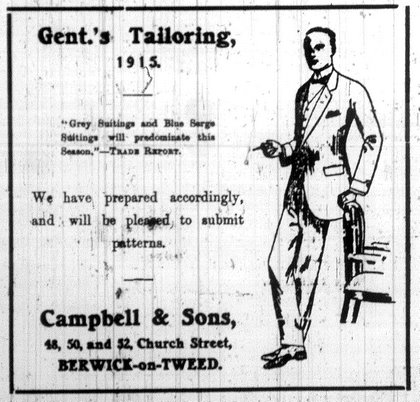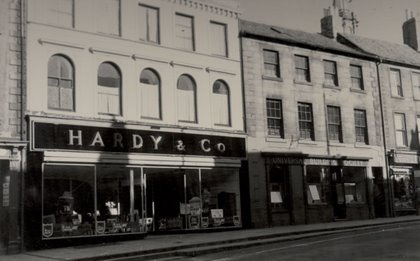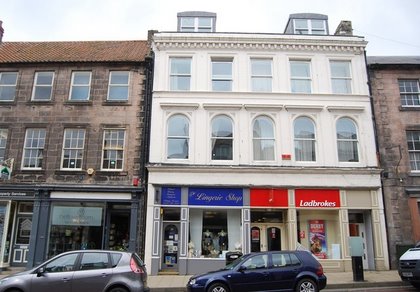
Children were kept occupied in several ways during their long stays at Stannington, perhaps one of the more unexpected was by being able to join the hospital’s own Scout and Guide groups.
A patient’s stay at the Sanatorium (later Children’s Hospital) normally lasted for several months and often extended into years. Keeping children occupied during this time was an important consideration for the institution’s staff. Outside of attending the on-site school which all children did as soon as their recovery from illness allowed there were several ways the hospital staff kept children busy and entertained during their stays.
To provide children’s evening and weekend activities the sanatorium staff included a Welfare and Recreation Officer. At the start of the 1950s this role was held by Mr Holmes and it was his responsibility to organise and manage activities for the children. In this role he was a member of the Hospital House Committee which met to discuss and oversee the day to day running of the hospital. For each meeting he submitted a report of the various activities he’s arranged in the previous month. In his monthly report for the meeting of August 1950 he noted that:
“I have attended two meetings in conjunction with forming a Scout and Cub section at the Sanatorium. I think this is a helpful scheme for the boys, as some of them are already members of the Boy Scout Movement and if we form a group at the Sanatorium patients leaving would be transferred to Scout Clubs in their own district. …
…I also propose to form a Girl Guide Section.” (HOSP/STAN/1/2/5)
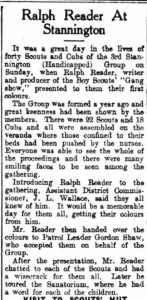
By the end of September 1950 four sections had been established; Scouts, Cubs, Guides and Brownies. In January 1952 Ralph Reader, actor, theatre producer and originator of the Scout Gang Show visited to hand the Scouts and cubs their first colours. On this occasion the membership, which totalled 40, including 22 Scouts, assembled on the veranda to receive the colours. Several troop members confined to bed were wheeled out onto the veranda to also be involved in proceedings.
Soon after this a Scout and Guide Group Committee was formed to oversee all 4 sections. At their meeting held on the 30th April 1952 Mr Holmes and Mrs Driver, the Scout and Guide leaders, reported on activities which had taken place:
“Two lessons on woodcraft and tracking and 2 scouts were to take their 2nd class badge. Mrs Driver reported that she now had 22 guides… … an expatient had been presented with the Badge of Fortitude at the Sanderson Orthopaedic Hospital and it was agreed that the Secretary write a letter of congratulations.”
“Arrangements were being made to hold the competition for the Mitford Cup at the sanatorium and it was suggested that the committee might act as host.” (HOSP-STAN 1/2/14)
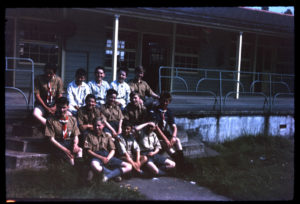
When it was held the Hospital Scout troop went on to win the Mitford Cup for their skill in knot making, knowledge of scouting law and oral relay skills. The range of activities undertaken by the Scouts carried on and even expanded to include Scout camps held in the grounds of the hospital as long as “Mr Holmes was present the whole time and returned the children to the ward each morning” (HOSP/STAN/1/2/14 9th July 1952).
Later that year Mr Holmes resigned as Welfare and Recreation Officer. In time he was replaced in this role by Mr Pullen and Douglas Johnstone took over as Scout Master. Douglas Johnstone, after his time with the Scouts, would go on to become to the General Secretary of the PCHA, later Children North East, the organisation which half a century earlier had originally built the sanatorium.
Activities carried on including a salvage drive, where used paper, bottles and jars were collected to sell and raise money, but it was decided not to collect bones due to the possibility of encouraging rats! This happened in conjunction with the normal activities of learning skills and gaining badges. In 1952 some scouts were noted in the Welfare and Recreation Officers report as being ready to sit tests for Semaphore and First Aid Badges and one guide had recently taken her Music Lover’s badge and was ready to take her Needlewoman’s Badge test.
Later the Scouts were allowed away from the hospital on troop outings. These included trips to places such as Northumberland National Park and the beaches of Craster, Alnmouth and Boulmer. Pictured below are 6 of the scouts whilst on an outing to Alnmouth in 1961.
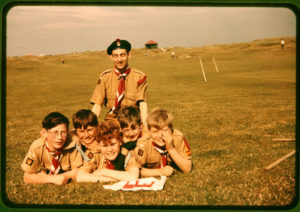
The groups also carried out fundraising activities in addition to their salvage drive, hosting dances and other events. With the money they raised they contributed £40 to the purchase of 5 TVs by the committee which was set up to celebrate the queen’s coronation in 1953. The Girl Guides also contributed to the fundraising efforts which included having a stall at the 1952 sanatorium garden party and raising £22 towards the installation of radio throughout the hospital.
The short history of the Scout Troop at Stannington ended in the autumn of 1962 when Douglas Johnstone, the Scout Master, disbanded the troop. However we know the Guide and Brownie sections continued after this as in the spring of 1964 the hospital recreation hall was refurbished and a timetable drawn up for its use; this included a slot for the Girl Guides on a Monday night between 5pm and 7pm and a slot for the Brownies at the same time on Tuesday nights. Though the scouts only had a relatively short history the troop was just one of many ways we’ve came across in the patient files and other records in which children were kept occupied and entertained during their stays. You can read more about this in an earlier blog post here.


